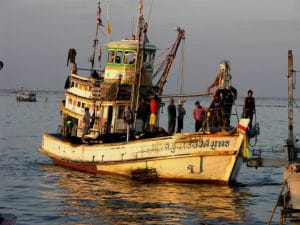Cornucopia’s Take: Slavery and human rights abuses appear rampant on fishing boats which bring as much as 20% of the world’s seafood catch to markets. Children are also used heavily in the processing of seafood. Slow Food’s campaign, Slow Fish, provides resources to research locally available seafood and a list of fish to avoid entirely.
Black Tide: Slavery and the Fishing Industry
Slow Food
by Andrea Cascioli
 |
There are murky seas out there, far from view, where predators lurk, much more dangerous than the hunters deep below the surface: human beings. And often, they’re as deadly to each other as they are to the marine life they hunt. The widespread of phenomenon of illegal, unreported and unregulated fishing, which often involves slavery and child labor, is responsible for the majority of catches in some parts of the world, and 20% of the worldwide catch, shaping the entire supply chain from the catch to the fishmongers and supermarkets.
In occasion of World Fisheries Day (November 21) the FAO, together with the Holy See, launched an appeal to States, international organizations and the fishing industry to guarantee fair and decent living conditions for all fishers. Fishing is one humanities most important resources, be it in terms of food security or as a line of work. According to the FAO, the industry employs 58.3 million people, or 4.4% of the 1.3 billion people who work in the primary sector, and it is estimated that fish and seafood account for 10-12% of the world’s diet.

